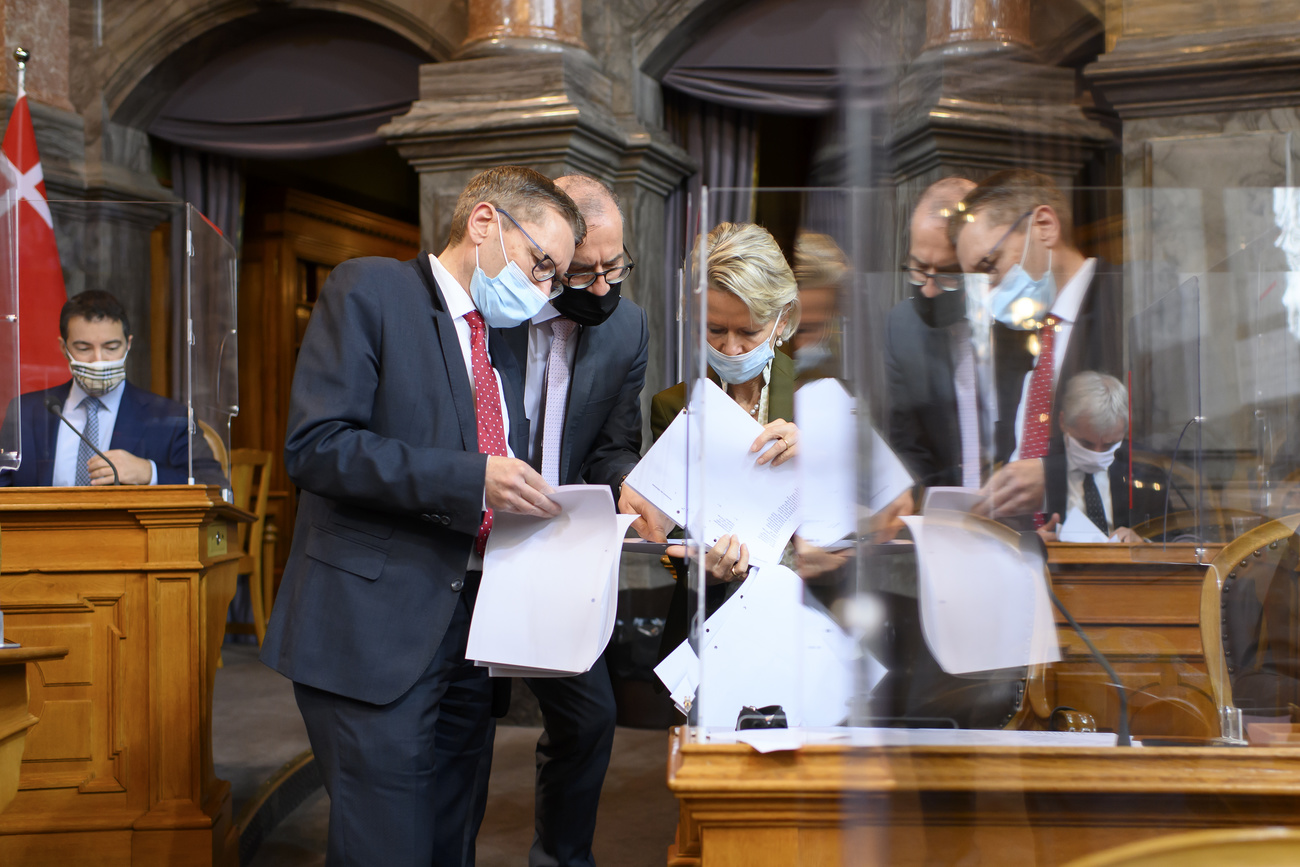Quality or speed? Scientists face Covid-19 dilemma

The Covid-19 pandemic has pushed science and research to the fore. But the unprecedented influence it currently wields over politics and public life has a downside: the crisis demands quick answers that risk scientists’ credibility.
“Since the start of the pandemic there has been a veritable tsunami of scientific publications about Sars-CoV-2,” says Subhra Priyadarshini, editor-in-chief of Nature India. She recently took part in an online discussion about science communications organised by the Swiss Academies of Arts and Sciences.
Worldwide, as much as 4% of all scientific publications in 2020 had to do with Covid-19, Nature reportsExternal link. Studies had to be produced particularly quickly at the beginning of the pandemic. So more studies than ever were published as so-called preprints (unpublished research manuscripts), even before they were peer-reviewed by independent appraisers.
According to Luca Tratschin, a science sociologist at Zurich University’s Centre for Higher Education and Science Studies, scientists face a dilemma on this issue: what is more important, quality or quick results? The publication of preprints primarily allows “scientific insights to be delivered as early as possible and in a time frame that ensures they are actionable”, he says.
But at the same time he points to “a danger that these premature results might have to be publicly corrected later”. That is what happened, for example, with two big Covid-19 studies about the malaria drug hydroxychloroquine which were published in the prominent journals The Lancet and New England Journal of Medicine and had to be withdrawn.
A Swiss study also had to retroactively drop investigations based on hydroxychloroquine, and pharmaceutical giant Novartis also pinned hopes on the drug for some time. Such examples can lead to a loss of confidence in the population and encourage the spread of misinformation.
More
The muzzle debate
In Switzerland many preprint studies are examined by the National Covid-19 Science Task ForceExternal link, which makes policy recommendations to the government based on the results. Members of the task force – and the studies they evaluate – often become the target of criticism from politicians and the public.
After some task force scientists expressed displeasure that the government wasn’t following their advice, some politicians recommended the researchers be banned from airing their views on the pandemic measures in public.
A group of citizens who were unhappy about the lockdown and restrictions on the freedom of assembly launched a referendum against the Covid-19 law, which provides the legal framework for the government’s pandemic measures.
The Swiss electorate will vote on the Covid-19 law on June 13. The so-called “muzzle clause”, which aimed to prohibit members of the task force from expressing their views in public, is no longer part of the law, having been scrapped by parliament after a heated debate. But it raised the question: where is the confidence in science – now and in future?

More
Critics force vote to rein in government’s Covid policy
A question of worldview
“The problem is that science sometimes presents some unpleasant realities,” says Reto Knutti, a professor of climate physics at the federal technology institute ETH Zurich. “And then there is a big temptation to say the experts have no clue, or they are just seeking to raise their profiles. Although in reality this is not about trust in science but just because it doesn’t all fit into one’s own worldview.”
Knutti does not think science has suffered too much as a result of the Covid-19 controversies. He points to the results of the Science Barometer, a survey conducted in the middle of the pandemic that shows the Swiss population’s interest and confidence in science has even increased during the pandemic.
But Knutti thinks the public struggles to differentiate between a single study or pre-study without peer review and a scientific consensus. As an example, he names the scientific conclusions drawn by the UN climate platform IPCC, which confirmed that climate change is taking place quickly.
In this instance, “thousands of people reviewed hundreds of thousands of studies over five years and produced a robust consensus”, he says. Knutti contributed to two of the IPCC reports.
Amid the coronavirus pandemic, in contrast, researchers face the huge challenge and political expectations to deliver usable results in the shortest of time frames. With other topics, this process takes decades. “Now we are getting this done in a year,” Knutti says. “And that means a lot of ricochets and side-effects.”
Huma Khamis, a science journalist at Swiss public radio, RTS, and vice-president of the Swiss Science Journalism Club, is less optimistic. The pandemic heralds “the end of the honeymoon between scientists and the population”, she says.
“What is negative is that only facts are communicated, but no doubts. What is positive is that interest in science has increased during the pandemic.”
The role of the media
The media bear a large share of the responsibility for communicating scientific conclusions. The #CovidSciComExternal link survey by various organisations and institutes in Switzerland, the US and India recently found that although faith in science has also taken a hit, researchers and universities enjoy more credibility than journalists. Influencers and columnists – an important source of information for many young people – ranked a long way behind.
The biggest challenge named by all those surveyed was quality control – both for science journals and for the media. Priyadarshini at Nature India says the publication handpicks only the best preprint studies and always describes them clearly as such. “It is then up to journalists to do a kind of peer review and contact experts.”
But does everyone do that? And do the media distinguish clearly enough between the different kinds of studies that are conducted and then explain their flaws? “Many editorial desks – newspapers or radio broadcasters – have cut staff in science journalism in recent years,” Luca Tratschin says.
In Knutti’s view, the problem is not necessarily the media but the fact that “we are not willing to pay for high-quality information: the pressure on the media is enormous, science journalism costs money, people hardly read anymore and they get their information from social media”.
Discussing doubt
Another complicating factor is that science is not only about results, but primarily about debates, experiments, testing theories and potential failure. In the scientific community there is broad consensus that this process is not discussed enough in the public sphere.
“Science constantly produces new knowledge,” Tratschin says. “But this new knowledge is accompanied by more questions, more uncertainty, more knowledge gaps.” This ambivalence and the dilemmas it can create is also what is fascinating about scientific research, he says. “Every scientific result entails uncertainty and has to be methodically and conceptually restricted. Science doesn’t simply reflect a clear and unambiguous reality.”
But complex scientific discoveries and announcements are often communicated in an abridged, distorted or exaggerated way in the media, putting the onus on scientists to share their results differently.
“Covid-19 has shown that we have to do more, that we must show what we know and what we don’t, but we shouldn’t present remedies,” says Marcel Tanner, president of the Swiss Academies of Arts and Sciences. “We must draw this distinction more firmly.”
Knutti suggests that researchers should present their findings as a story in order to communicate them more understandably and transparently. He cites economist and Nobel Prize winner Daniel Kahneman, who said that “No one ever made a decision because of a number. They need a story.”
The muzzle debate about the national Covid taskforce is not all bad, Knutti says. “This and the opposition from the public and the media have shown that trying to silence or censor unpleasant facts is not the right way.” Individual responsibility can only work “if people can get their own informed overview and all these evaluations are on the table”.
Knutti points out that in the context of the pandemic, communicating science and advising politicians are two different things. “The first is a question of media consumption, the other is about how to establish dialogue with politicians.”
Even if communication among the scientific community, the public and the media works well, that does not mean that “we have found a process for exchange with politicians”.

More
Coronavirus: the situation in Switzerland

In compliance with the JTI standards
More: SWI swissinfo.ch certified by the Journalism Trust Initiative









Join the conversation!